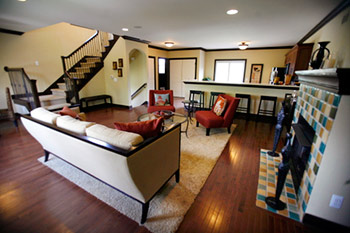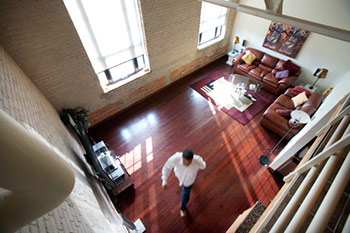Selling Homes in Detroit: It’s About More Than Just the Benjamins
Are out-of-state speculators the only people buying and dilapidated homes the only thing selling in Detroit? Are Detroit real estate agents’ fortunes all but lost? Nope.
If all you knew was what you saw in the national media, you’d think
being a realtor in the city of Detroit would qualify you for a guest
spot on the Discovery Channel’s “Dirty Jobs” show. Talk of $100 houses makes Detroit seem like the blue-light special of real estate. Everyone from CNN
on down is telling the story of out-of-state speculators snatching up
Detroit property like the sample vultures at Costco mindlessly gorging
on the freebies. It sounds sad and ugly.
There’s some truth in those cheap property stories, but that’s only one part of the real estate picture here.
 Enter Sabra Sanzotta’s beautifully decorated live/work space in Eastern Market’s FD Lofts,
Enter Sabra Sanzotta’s beautifully decorated live/work space in Eastern Market’s FD Lofts,
where swaths of luxurious fabric drape brick walls, silver cut out
butterflies glimmer from the impossibly high ceilings and the kitchen
gleams with fancy appliances. As Sanzotta sits, chatting and monitoring
her buzzing cell phone, she doesn’t seem on the precipice of defeat,
gnashing her teeth and shaking her fist at the heavens. She offers no
“why me?” diatribe and doesn’t rail against the state of real estate.
She just seems busy. Really busy.
“This has been our best year,” says the proprietor of The Loft Warehouse. You may have a hard time believing this, but she means that this year — yes 2009 — has been her best yet. Huh?
Sanzotta
isn’t the only one telling that story. Realtors who specialize in the
greater Downtown area and some of the city’s more affluent
neighborhoods say they aren’t immune to the realities of a national
mortgage crisis, sky-high home foreclosures and other unsavory economic
realities. They aren’t quitting the city either, not when there’s good
money to be made.
Many of the city’s realtors are selling more
than just cheap houses to scavengers. They are selling things like
luxury lofts to happy new residents. They sell fixer uppers to
families, condos to empty nesters. Good homes to people who will live
in them. And Detroit agents are making money doing this, even if to
do so they have to work their tails off and harder than ever.
What are they buying?
Oh, that mythic $100 house. It’s out there, but most of us couldn’t or wouldn’t live there.
While innovative projects like the internationally famous Mitch Cope/Gina Reichert Power House
are extremely cool, not everyone has the guts or the vision to be gutsy
and visionary. Some people want to buy a home, move in and live in it
without first giving it an extreme makeover. You can do that in
Detroit, real estate agents say, but you’ll have to pay a little more
than a Benjamin.
Joy Santiago, a realtor and resident of The Villages, says
people who have been waiting are now moving forward to get into
properties and neighborhoods that in another time would have been out
of reach. “We’ve got the biggest opportunity ever to be able to
purchase Riverfront, Downtown, or Midtown property,” she says.
Condos
on the riverfront that were once six figures are going for less than
$100,000. Houses in sought-after neighborhoods like The Villages —
historic homes that anywhere else in the nation would be worth millions
— are more affordable than ever.
In Midtown on highly desirable historic Ferry Street, Sanzotta is selling new construction luxury condos at Centurion Place starting at $150,000 – about half of what they were selling for a couple years ago.
One
of Sanzotta’s young professional customers, Damoni Hurt, a marketing
manager for Ford who is in his 30s, was one of those waiting for the
right time. He just bought a condo with a downtown view on E. Jefferson
across from Belle Isle.
“Now is the opportunity to transition from renting and sitting out to really jumping in,” he says.
Hurt bought a bank-owned condo for $80,000 in The Lofts at Rivertown,
a building that a couple years ago had units going for at two to five
times as much. He knew the location was perfect: He was living there
already. “It was a no-brainer from a quality of life standpoint,” Hurt
says. “I was living in the same building renting, paying twice as much
for rent.”
 And
And
he was not just buying junk. His is a tri-level loft with high-end fixtures.
“This is the whole kit and caboodle,” he says. “It’s a foreclosure, but
it wasn’t a falling apart, dilapidated kind of East Side house deal.”
The
same space in downtown D.C. or Atlanta — where he’s lived before —
would have been out of his reach: “It’d be $1 million plus in D.C. In
Atlanta, half a million easily,” he says.
In addition to
foreclosures, realtors say another big part of their business right now
is short sales. In these cases, they negotiate with the banks to let
homeowners sell the homes for less than they owe, and then the banks
forgive the difference.
A short sale, however, is a lot more
difficult and takes longer than a traditional sale, but realtors say
that when these short sales work out, it’s a win-win for all the parties
involved. In a short sale, the home won’t sit empty, the seller gets out of the
mortgage, the buyer gets a good deal and the realtor gets a better
commission than he or she would have gotten if the home was sold in a
foreclosure.
More than foreclosures
Foreclosures and short sales aren’t the only deals being made in the city. It’s squishy, but there is still a market out there.
Last month, Sanzotta sold a $165,000 condo in Harbortown
to a firefighter who plans to retire on the riverfront. She’s also
closing on a $141,000 townhome in Corktown in a few days. Both are not
foreclosures.
Ryan Cooley of O’Connor Real Estate and Development in Corktown, says he’s had a lot of demand for architecturally significant properties like the Mies van der Rohe townhomes in Lafayette Park.
This month, in fact, he showed them to a couple from Baltimore,
relocating here to work at Wayne State University. And it looks like they’re buying.
 Santiago just wrapped filming an episode of the ultra-addictive real estate drama “House Hunters”
Santiago just wrapped filming an episode of the ultra-addictive real estate drama “House Hunters”
for HGTV. She showed the buyers three $400,000 properties — all within
Detroit’s city limits. If you watch the show, which we already
established that you do, you know they always buy something at the end.
And realtor Austin Black II,
who works a lot in his Midtown neighborhood, says a customer walked in
recently and paid a cool half million cash for a penthouse loft in the new
Willys Overland Lofts development in Midtown.
Those
stories — market rate sales and big properties with high price tags —
might be more rare thanks to foreclosures and short sales, but they are out
there.
Who is buying?
Black
says 2009 is turning out to be a good year for him, as well, but he’s
had to hustle. “Part of it is, I am working with a lot more people, and
you have to work a lot harder with those buyers,” he says. Buyers have
a lot more from which to choose, and they want to see the options, he
says. “But it’s paying off.”
There might be out-of-state
speculators looking to buy up Detroit by the block, but Black, Sanzotta
and others who regularly sell in the city say those customers aren’t as
frequent as one might think. And the media reports mislead people to
believe that for pennies, they’re going to get a great house.
 “I’ve
“I’ve
gotten calls from people who are not from this area and who are from
other parts of the country, and their impression is that they are
getting a livable home for $100 in a livable neighborhood,” Black says.
“I think you’ll find the market is typically more stable in Midtown.”
OK,
so who are the regular buyers? Sanzotta says many of her customers are
professionals coming to work at the Medical Center. Black sells a lot
to empty nesters, too. Cooley has a lot of customers relocating from
out of state. Black does, too, and says that “95 percent of them grew
up in the ‘burbs, and a good percentage of that group has lived in
cities across the country.” They want an urban lifestyle, and they want
it here.
In Detroit, he says, new development has slowed but
there’s still a trickle, like the newly rehabbed condos on Mack in Brush Park that Black sells. Black says selling new condo developments is tricky right now
because lenders want 15 percent down on condos not already half sold,
and most buyers don’t have that to pony up. Sanzotta is facing the same
challenge at Centurion, but she’s seeing new interest in the property.
But even with the slowdown, Black says don’t let those big media guys fool you: In Detroit, there’s still plenty of life.
“One
of the unique things about the downtown and Midtown areas, we’ve lost
some businesses and some of the developments that were proposed never
got off the ground, but you still see businesses opening, places under
construction, new restaurants,” Black says. “I still see more people walking outside, more people
walking and running. Things are still happening and people want to be down here.”
Clare Pfeiffer Ramsey is managing editor of Model D. Send feedback here.




